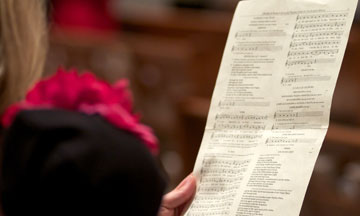
 The era of the new Roman Missal officially began Nov. 27, and it seems to be going well.
The era of the new Roman Missal officially began Nov. 27, and it seems to be going well.
“I heard from many people that the new texts help them to pray more deeply, that now they’ll actually have to think about what they’re saying,” said Father Bryan P. Babick, vicar for divine worship and sacraments.
He is also the parochial vicar at Christ Our King Church in Mount Pleasant.
Preparation for the change started months ago as many parishes hosted retreats and seminars to discuss the topic. Some gradually introduced new responses. Father Babick offered workshops around the state, and on the first Sunday the faithful used everything from prayer cards to bulletin inserts to help them say the right thing.
In interviews with The Miscellany, people seemed supportive of the new translation. Many said their new responses were simple to learn compared to the challenges priests face.
Some called the new language beautiful and challenging, but unwieldy in some places.
“It’s a step in the right direction,” said Joshua Burgess of Columbia. “The reverence of the language is much better than what we’ve been using.”
The use of “consubstantial with the Father” instead of “one in being with the Father” in the Nicene creed was the biggest stumbling block.
“‘Consubstantial’ doesn’t mean anything to me,” said Mark Fitzgibbons of St. Peter Church in Beaufort. “It may be theologically correct but if it’s supposed to be a prayer of the people, I’m not sure how I’m going to explain it to my 7-year-old granddaughter … I’m sure it’ll just take time to get used to it.”
Carrie Penny of St. Joseph Church in Columbia said change was a challenge, especially since she’s a recent convert.
“It’s a little frustrating, because as a convert you feel like you just spent all this time learning the Mass and now it all changes,” she said. “Some of the new language doesn’t quite roll off the tongue, but I’m willing to work with it.”
Many said the new translation helped them pay more attention to the Mass.
“I like that it slows the congregation up to reflect and think about the Creed and some of the other responses we have just methodically recited at Mass without really getting the feel of what we’re saying,” said Barbara Birds of Charleston’s St. Patrick Church.
Specific new responses touched some people.
Michelle Quigley of St. Francis by the Sea Church in Hilton Head likes saying “And with your spirit” in response to the priest.
Brandon Smith of St. Gregory the Great Church in Bluffton is moved by the new repetition of “my fault, my fault, my most grievous fault” during the Confiteor.
“It’s nice to be able to reflect on my own sins so I can be better prepared to receive the Eucharist,” he said.
Not everyone thought change was necessary, however.
“The new translation is confusing for the people, and I also think it must have cost a lot of money to reprint all the missals and the other material used at Mass,” said Donald J. Lynch of Longs, a member of Our Lady Star of the Sea Church in North Myrtle Beach. “I just don’t understand why it was done.”
David Didimamoff, who attends St. Gerard Church in Aiken, said the old translation was closer to the way people really speak, and he fears some of the progress of the Second Vatican Council has been undone.
“I don’t know why we went to all this effort when there are so many problems the leaders in Rome could have addressed,” he said.
Greer resident Deborah Gourdin, who attends St. Anthony of Padua Church in Greenville, likes the idea that the new translation is closer to those used in other nations.
“We’re becoming more in line with the universal church, and the words are more rooted in Scripture,” she said. “I think it’s all wonderful. It’s more profound.”
